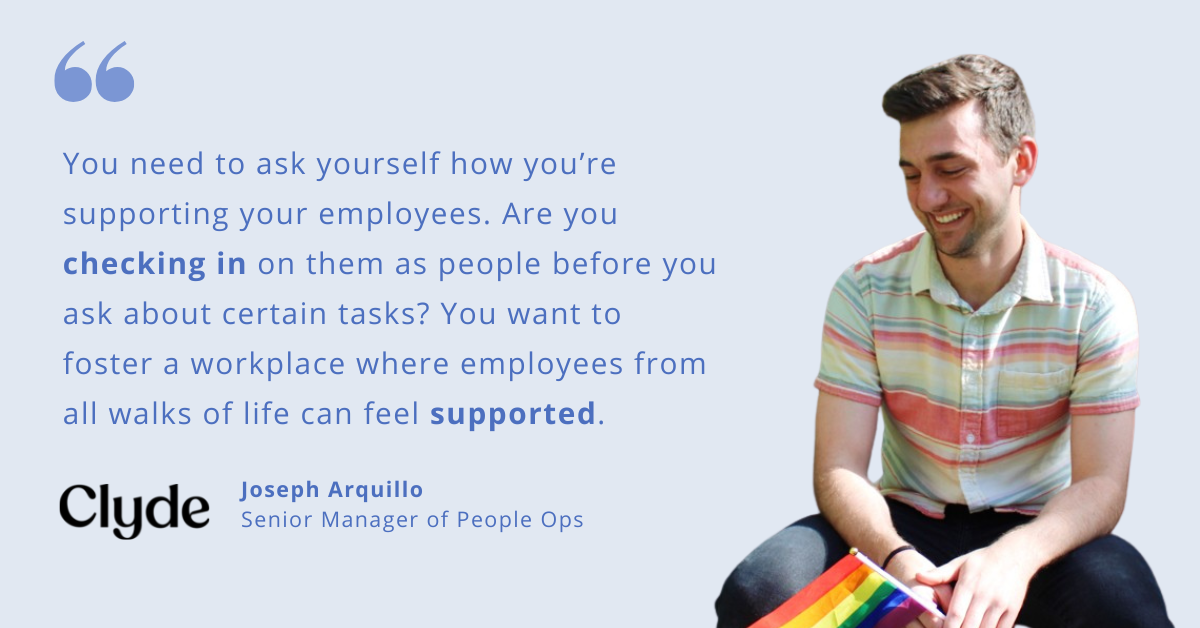Joseph Arquillo doesn’t work in Human Resources — he works in People Operations. And the distinction matters.
“It was named ‘human resources’ because it saw humans as resources, utilized for certain tasks or behaviors. But that’s not really what it’s about,” says Joseph, who is a Senior Manager of People Ops at Clyde.
“Calling it ‘people ops’ adds back what you lose with ‘HR.’ My philosophy is that I am there to support you. I am there to work with you, empower you, and enable you so you can be your best self.”
For Joseph, a key element of helping employees become their best selves is making sure that the workplace, whether in-person or virtual, is an inclusive space for all. That doesn’t happen by accident — it requires a dedicated DEIB strategy and leaders who are committed to asking hard questions of themselves and others.
We sat down with Joseph to hear more about his professional journey, and the practices of leaders who create environments where everyone feels included.
More Than Just a Number
As a college freshman, Joseph planned on sticking with liberal arts when it came to choosing a major. But then he took a class in Boston College’s School of Education, and loved its holistic approach to applied psychology.
This inspired him to switch his major to psychology and human development, and select minors in political science, and management and leadership, where he enjoyed learning about organizational psychology.
After graduation, he explored the consulting space to put theory into practice, but found out during an internship at a multinational consulting firm that finance or accounting weren’t the places he wanted to build his career.
“Since Big Four companies have 250,000 employees, you become just a number,” he says of the experience. “It wasn’t my cup of tea. Too corporatized.”
That kicked off Joseph’s interest in startups.
“It’s always fun to get in the weeds! One thing that’s very interesting to me is a challenge,” he says. “When you’re helping a company like Clyde grow and scale, joining when they’re at a Series B and helping them get to the next level, you really get to focus on the interaction between people, process, and product,” explains Joseph. “You need to hire the right people to work towards increasing efficiencies in all areas, but also make sure that we’re enabling them to create a strong product.”
6 Keys To Building Inclusive Spaces as a Leader
Across the different industries and companies that Joseph has worked in, he’s identified the behaviors that create truly inclusive environments — as well as those that discourage them.
Here’s what he’s seen:
- First, recognize your own privilege. “If you’re a man, you have privilege, even if you’re a gay male. If you are a white woman, you have racial privilege. It’s really important that you’re cognizant while you interact with somebody how they might interpret the interaction based on your identity.”
- Leaders should always speak last. This is important always, but especially in in-person spaces, where it might seem even more nerve-wracking to speak up in a crowd, says Joseph. “You want to make sure you’re creating that space for employees who aren’t as senior to feel comfortable voicing their thoughts.”
- And, leaders should use check-ins liberally. “You need to ask yourself how you’re supporting your employees. Are you checking in on them as people before you ask about certain tasks? You want to foster a workplace where employees from all walks of life can feel supported,” he says.
- DEIB isn’t just about adding new initiatives — sometimes it’s about removing barriers. “You need to remove unnecessary bias,” explains Joseph. “That can mean making sure you have appropriate policies and practices that don’t hinder people depending on who they are or where they live.”
- Maximizing participation requires planning with a diversity lens. Joseph has helped the Clyde team gather together and bond as a group. Along the way, he’s been careful to consider physical and psychological safety for everyone involved. “For instance, if you’re doing an event, do you have someone who’s not drinking? Have you set up the environment for people who might have a physical disability, or carefully planned the flow of activities for people who might be neurodivergent?”
- Saying you want to be better isn’t enough — articulate actions you will take. “Pride is a great example,” explains Joseph. “Yes, June is a time to celebrate. But it’s also a time to march. And beyond that, how do you show up and celebrate with the LGBTQIA+ community throughout the year?”
Embracing the Unknown
If you visit Joseph’s LinkedIn profile, you’ll see his personal motto: “Without challenge, change, and a bunch of unknowns, it’s no fun.”
That belief has led him to study what he’s passionate about, to take on new and exciting roles at growing startups, and now, at Clyde, to help formalize what world-class people operations looks like at a fast-growing company.
“I view myself as a connector that really empowers people, challenges teams, and helps drive us towards what I consider to be an improved future,” he says. “I feel like it’s my responsibility to be the chief advocate for each of our employees, and remove any barriers in the way of their growth.”
Want to learn more about what opportunities Clyde offers? Check out their open roles!



